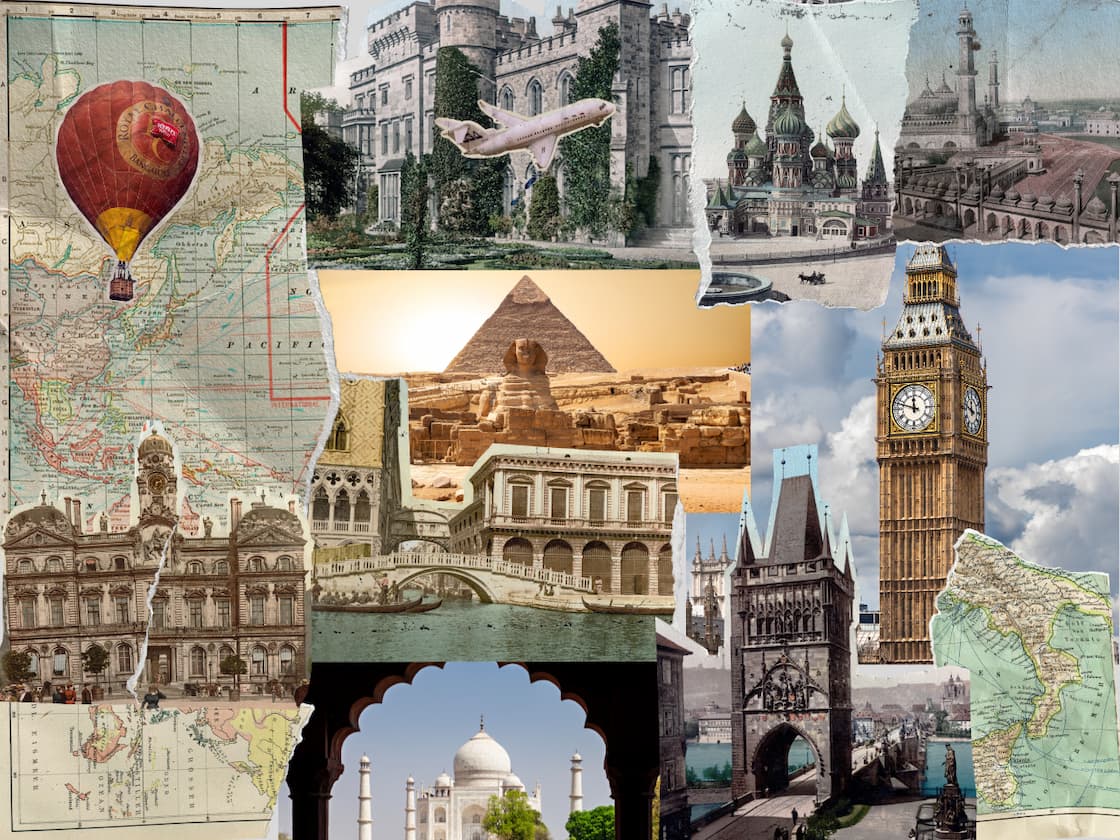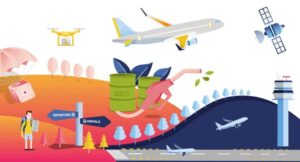
Traveling is one of the best experiences in life. But to make the most of it, planning your trip is essential.
Planning a trip is never as easy as it seems.
Due to the amount of options and information available, it is normal to feel overwhelmed, especially when you still don’t know much about your dream destination.
However, with the right organization, you can avoid unexpected events, save money and enjoy every moment without stress.
By following this step-by-step guide, you can ensure that your next adventure is unforgettable!
How to start planning your trip?
To plan your ideal trip, the best thing to do is to start by defining your desires.
As well as budget limitations, personal needs, etc.
In addition, having a clear vision of who you are in relation to travel helps a lot to define the characteristics of your trip.
What type of traveler are you?
One of the factors that most influences the satisfaction and experience of your trip is knowing what type of traveler you are.
There is nothing more frustrating than expecting something and when you arrive at your destination, everything is different from what you dreamed of.
However, in order to plan your trip, you need to know yourself well.
This makes it easier to find your best destination.
The better you know yourself and adapt your trip to your style, the better your travel experience will be.
Here are some types to help you get started.
- Standard tourist: This is the tourist who follows travel packages.
- Explorer tourist: This is the one who, although following the majority, tries to find an alternative.
- The independent tourist: This one does not like to follow the standard, avoids mass tourism, with an individualized and independent approach.
- Luxury tourist: They like to feel unique.
- Business tourist: These are those who travel for work.
See this article about the types of tourists in more detail.
You will find everything you need to plan your trip on the Blog
What is the purpose of the trip?
The purpose of a trip can vary greatly depending on your goals and needs.
Here are the main types:
- Work
- Leisure
- Studies
- Health and Well-being
- Events and Culture
- Volunteering and
- Missions
- Religious Tourism
- Gastronomic Tourism
11 Mistakes That Make Your Trip More Expensive: Learn How to Avoid Them.
Duration of the trip.
The duration of the trip is essential to get an idea of the necessary logistics and consequently the costs.
- Very short trips (1 to 4 days): Ideal for weekend getaways and holidays.
- Standard trips (1 to 2 weeks): Balance between exploration and rest.
- Long trips (more than two weeks): Possibility to explore several places in a single itinerary.
Travel Company.
Knowing who you are traveling with is essential for planning your trip.
In addition, it ensures that the trip is smooth and enjoyable for everyone.
It is very important to talk to each other about:
Style Compatibility:
- Some people prefer itineraries full of activities, while others like to relax.
- Differences in the pace of travel can generate conflicts if they are not aligned beforehand.
Tour Preferences:
- Some people may want the beach, another mountain, another big city.
- Adjusting interests beforehand avoids frustration.
Coexistence and Patience:
- Traveling together requires intense coexistence, and small habits can be annoying.
- Having a good relationship and knowing how to deal with unexpected events is essential.
Planning and Responsibilities:
- Some people are organized, others leave everything to the last minute.
- Defining who takes care of tickets, accommodation and tours avoids stress.
Personal needs:
- People have different transportation needs, some are afraid of flying, etc.
- Some dietary choices or restrictions
- Religion can interfere with travel style
Financial planning in the life of a traveler.
Now with this information we can really start planning the trip
Planning the trip
Choosing the destination
The first decision is where to go.
Knowing exactly where to go is essential to ensure a pleasant experience without any unexpected events.
Once you have decided on the destination, you can choose a route and this makes it easier to plan your next steps.
It is easier to create a plan for “I’m going to Paris in the summer” than for “I’m going to Europe” or “I’m going somewhere”.
Without a definition, it is impossible to create a plan. The more defined your destination, the easier it is to plan.
This may seem obvious, but there are some factors you should consider:

- Budget: Define how much you can spend. This influences the choice of destination and the duration of the trip.
- Climate: Research the best time to visit the place.
- Interests: Do you prefer beaches, mountains, historic cities or wilderness?
- Ease of access: What is the transportation like? Do you need a visa?
Setting the Budget
Knowing your available budget is essential for planning your trip.
This will help you avoid surprises and ensure that everything goes as planned.
With a well-defined budget, you can enjoy your trip without financial worries.
Budget is one of the main constraints on travel.
It can even limit where you can go and how.
There is no point in just wanting to travel to Paris for 15 days if you only have US$1,000.00 available to spend on the trip.
Another crucial factor is that it prevents debt, preventing impulsive spending that can compromise your finances.
Consider the main costs:
- Flights: Research in advance to get good prices.
- Accommodation: Hotels, guesthouses, Airbnb or hostels?
- Food: Will you eat in restaurants or prefer to cook?
- Local transportation: Metro, bus, car rental?
Tours and activities: Some attractions require advance tickets.
Guide to saving 50% on the cost of airfare.
How to Stay Connected While Traveling Internationally Without Spending a Fortune
When to go?
When to go has a big influence on the success of your trip, as well as the cost, stress, etc.
It’s very different to say you’re going to Paris next week or in 4 months.
In addition, a crucial factor in deciding when to go is what the weather is like there and what kind of tourist season you’ll find.
Paris in January, July or September is completely different.
The number of tourists, the type of clothing you’ll wear.
The costs of accommodation, restaurants and tours are also very different.
The weather is a determining factor in your trip, as it directly influences your luggage, tours and even your health and safety.
What attractions will you visit?
Knowing what activities you will be participating in will allow you to find the right resources.
In addition to resources, it will also help you figure out if you need to make reservations for the tours or activities you have chosen.
Keep in mind that while some attractions offer cheaper prices in person, others offer discounts for those who book in advance/online.
Knowing what activities are available will also help you plan your itinerary, saving you time and money.
How much does your trip cost?
To know how much a trip will cost, you need to research several factors that will influence your budget.
Here is a list of the main items you need to consider:
Tickets and Transportation
Price of plane, bus or train tickets. Use websites like Google Flights, Skyscanner.
Costs of local transport: metro, bus, taxi or car rental.
Hosting
Hotels, hostels, Airbnb or guesthouses. Check on Booking, Airbnb and Hostelworld.
Extra fees, such as taxes and breakfast included or not.
Food
Average price of restaurants at your destination. Use TripAdvisor or Google Maps.
Cost of groceries if you prefer to cook.
Tours and Entertainment
Entrance fees to tourist attractions, museums, parks and events.
Guided tours, concert tickets and local experiences.
Travel Insurance
Quotes from insurance companies such as Assist Card, World Nomads.
Medical coverage and trip cancellation.
Exchange and Fees
Local currency exchange rates and conversion rates.
Withdrawal and card payment fees abroad.
Visa and Documentation
Fees for issuing a visa, if necessary.
Additional costs for passport or mandatory vaccinations.
Extras and Emergencies
Extra money for purchases and incidentals.
Tips and local taxes.
Book accommodation.
You’ve already decided on a travel date, so you can book your accommodation. There are many types of accommodation and many ways to book.
When planning your trip, the number of days also depends on your strategy.
If you’re traveling for up to a week and have a set schedule, it’s a good idea to book accommodation for the duration of your trip.
This will give you peace of mind (or if you’re visiting during peak season).
For longer trips, booking the first few days will give you peace of mind upon arrival and may give you more flexibility.
Once there, you can get insider advice as well as information from other travelers.
You can use this information to plan your next steps regarding accommodation.
Here are my favorite sites when it comes to finding the best deals on accommodation:
Booking, Hostelword, and AirBnB.
Travel Insurance
Although it is not an item that is directly part of your trip.
However, travel insurance can make all the difference in your experience.
I can’t imagine traveling without it, because millions of situations can occur during the trip and without it, everything can simply become torment.
I have seen many people in great difficulties and those who had insurance had all the support, while those who didn’t had one of the worst moments of their lives.
One of my friends went to India and caught a food poisoning (a very common thing when traveling to India).
He spent 15 days in a local hospital and was transferred to a hospital in Brazil, with all the medical care paid for by the insurance.
If he didn’t have insurance, this would have cost tens of thousands of dollars.
On my trip around the world, I met a girl in Hanoi who had broken her foot in a motorcycle accident and had no money or insurance.
She had to ask some tourists for money to be able to go to a very dubious clinic, to receive very poor care.
She spent two weeks waiting for her parents’ help so she could return home.
So include insurance in your cost and have a more peaceful trip, even if something goes wrong.
List of the main items to be covered by insurance to plan your trip:
- Airfare
- Travel insurance
- Documentation and vaccinations
- Accommodation
- Local transportation
- Tours.
Documents, Vaccinations and Travel Insurance
Now that you have decided where you will be traveling, you can check the necessary documentation and vaccinations.
For trips within Brazil, Brazilians only need to check the necessary vaccinations if they are going to forest regions, such as the need for a yellow fever vaccine.
For international trips, you will need:
– Passport.
For any international trip, your passport is the most important document and, as a general rule, it must be valid for at least 6 months from the date you enter the country.
In more extreme cases, your entry may be denied if your passport is valid for less than 6 months.
– Visa.
Brazilians do not need a visa for many countries.
See the list of countries that Brazilians do not need a visa for and the standard visit time.
For other countries, you must apply for a visa before traveling to the country.
See the consular portal of foreign relations for information on how to find the embassies of each country.
– Travel insurance.
Some countries require travel insurance like European countries
– Currency and payment methods.
Each country has its own local currency, but some may accept US Dollars or Euros.
Today we have many payment options, but credit cards are the most widely accepted.
Currently, currency may be the only form of payment in remote regions.
– Vaccinations.
For international travel, you must consult the consulate of the country you are traveling to to check whether vaccinations are necessary.
Proof of this is provided through an international vaccination certificate.
See here on the Anvisa Portal how to obtain this document
Stay focused on your trip
Even after buying your tickets, booking your hotel and having everything planned, it is not time to forget about your trip until the day of departure and/or return.
Many things can change, such as weather conditions, political issues, etc.
In addition, it is essential to review the situation of your accommodation, check other means of transport, which attractions will be open or not.
Use this time to get more familiar with the place and its characteristics.
You can discover many interesting things.
And many of them will transform your life.
My trip to Moscow had been planned two months in advance, but I only found out that it was the 870th anniversary of the city 1 week before arriving, which completely changed my schedule, as there were dozens of events taking place that forced me to change my plans.
On my trip to Nepal, I was stuck in Kathmandu due to rains in Lukla for more than 1 week, which forced me to go south to Pokhara to make the most of the time.
Coordinate correspondence and payment of bills before leaving on your trip.
Planning your trip also involves other matters besides the trip.
Although most people would like to, bills, correspondence and all your obligations do not stop just because you are traveling.
There is also nothing more unpleasant than receiving late bills.
For recurring payments, it is best to set up automatic debit.
For non-recurring payments, it may be an option to advance or postpone the payment.
Those who still have physical mail being delivered or to prevent possible mail that may arrive, you should arrange with a neighbor or relative to remove the mail, thus increasing security.
Of course, you can still pay your bills while you are traveling, but this will take away from the time you need to enjoy your trip.
Packing Your Bags
Now that your trip is approaching, it’s time to pack your bags.
Pack your bags two weeks in advance and check them occasionally to make sure you haven’t forgotten anything or are taking extra things that you won’t need.
If you’re feeling nervous or anxious, don’t worry — that’s perfectly normal.
Packing can be a challenge, but these tips make it easier:
- Pack versatile clothes that suit the climate of your destination.
- Opt for comfortable shoes.
- Pack a toiletry bag with essential items.
- Don’t forget electronics and power adapters.
- Only take what you need to avoid overpacking.
Tips for Saving Money While Traveling
Want to spend less and travel more? Here are some valuable tips:
- Avoid tourist restaurants and explore places frequented by locals.
- Use public transport instead of taxis.
- Buy tickets to attractions online, they are often cheaper.
- Opt for accommodations with kitchens to save on meals.
- Look for free tours, such as guided walks.
Reinforcement with Extra Tips for a Smooth Trip
- Keep a digital version and a physical copy of important documents.
- Inform your bank about your trip to avoid having your card blocked.
- Learn a few basic phrases in the local language. It’s not necessary, but it will make you more friendly with locals.
- Download offline maps so you don’t have to rely on the internet.
- Respect local culture and customs.



